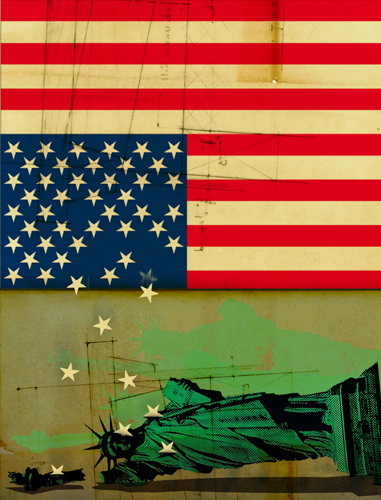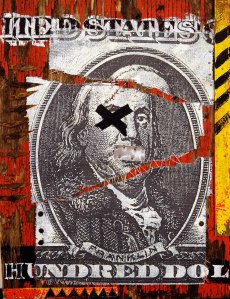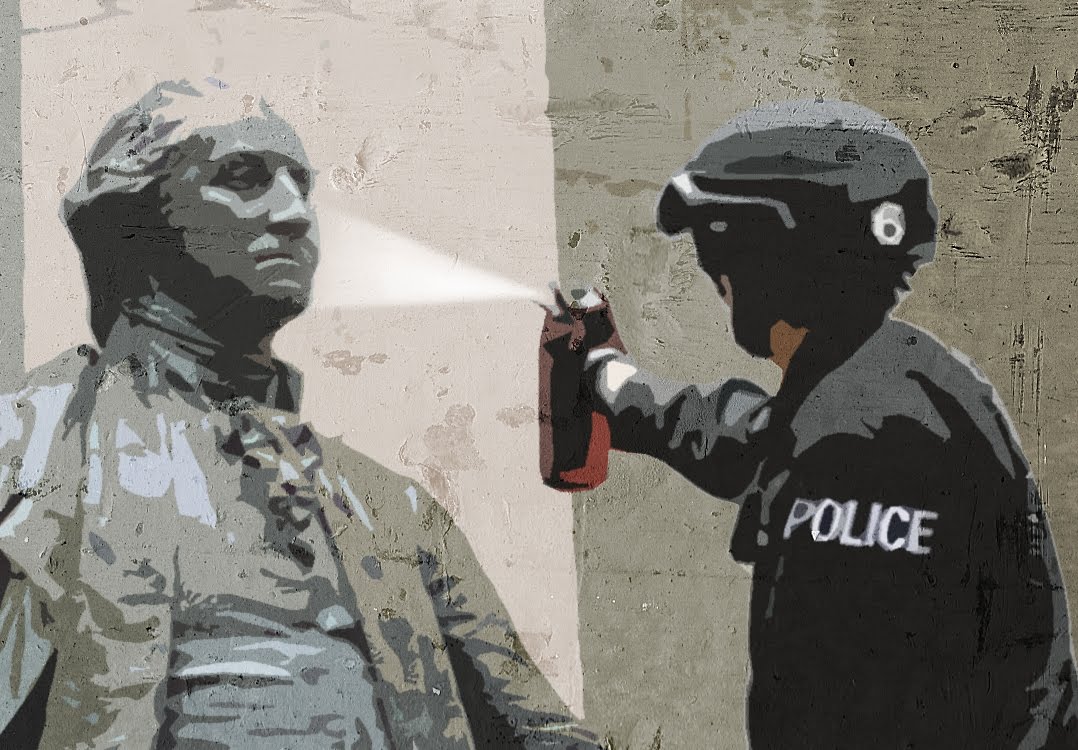
Painting by Anthony Freda: www.AnthonyFreda.com
– Scorecard: How Many Rights Have Americans REALLY Lost? (Washington’s Blog, Feb 21, 2013):
How Many Constitutional Freedoms Do We Still Have?
Preface: While a lot of people talk about the loss of our Constitutional liberties, people usually speak in a vague, generalized manner … or focus on only one issue and ignore the rest.
This post explains the liberties guaranteed in the Bill of Rights – the first 10 amendments to the United States Constitution – and provides a scorecard on the extent of the loss of each right.
First Amendment
The 1st Amendment protects speech, religion, assembly and the press:
Congress shall make no law respecting an establishment of religion, or prohibiting the free exercise thereof; or abridging the freedom of speech, or of the press; or the right of the people peaceably to assemble, and to petition the Government for a redress of grievances.
However, the government is arresting those speaking out … and violently crushing peaceful assemblies which attempt to petition the government for redress.
A federal judge found that the law allowing indefinite detention of Americans without due process has a “chilling effect” on free speech. And see this and this.
The threat of being labeled a terrorist for exercising our First Amendment rights certainly violates the First Amendment. The government is using laws to crush dissent, and it’s gotten so bad that even U.S. Supreme Court justices are saying that we are descending into tyranny.
For example, the following actions may get an American citizen living on U.S. soil labeled as a “suspected terrorist” today:
- Being young (if you live near a battle zone, you are fair game; and see this)
- Protesting anything (such as participating in the “Occupy” movement)
- Questioning war (even though war reduces our national security; and see this)
- Criticizing the government’s targeting of innocent civilians with drones (although killing innocent civilians with drones is one of the main things which increases terrorism. And see this)
- Stocking up on more than 7 days of food (even though all Mormons are taught to stockpile food, and most Hawaiians store up on extra food)
- (Not having a Facebook account may soon be added)
And holding the following beliefs may also be considered grounds for suspected terrorism:
- Liking the Founding Fathers
- Being a Christian
- Being “anti-nuclear”
- Being “anti-abortion”
- Being “anti-Catholic”
- Being “anti-global”
Of course, Muslims are more or less subject to a separate system of justice in America.
And 1st Amendment rights are especially chilled when power has become so concentrated that the same agency which spies on all Americans also decides who should be assassinated.
Second Amendment
The 2nd Amendment states:
A well regulated Militia, being necessary to the security of a free State, the right of the people to keep and bear Arms, shall not be infringed.
Gun control and gun rights advocates obviously have very different views about whether guns are a force for violence or for good.
But even a top liberal Constitutional law expert reluctantly admits that the right to own a gun is as important a Constitutional right as freedom of speech or religion:
Like many academics, I was happy to blissfully ignore the Second Amendment. It did not fit neatly into my socially liberal agenda.
***
It is hard to read the Second Amendment and not honestly conclude that the Framers intended gun ownership to be an individual right. It is true that the amendment begins with a reference to militias: “A well regulated militia, being necessary to the security of a free state, the right of the people to keep and bear arms, shall not be infringed.” Accordingly, it is argued, this amendment protects the right of the militia to bear arms, not the individual.
Yet, if true, the Second Amendment would be effectively declared a defunct provision. The National Guard is not a true militia in the sense of the Second Amendment and, since the District and others believe governments can ban guns entirely, the Second Amendment would be read out of existence.
***
More important, the mere reference to a purpose of the Second Amendment does not alter the fact that an individual right is created. The right of the people to keep and bear arms is stated in the same way as the right to free speech or free press. The statement of a purpose was intended to reaffirm the power of the states and the people against the central government. At the time, many feared the federal government and its national army. Gun ownership was viewed as a deterrent against abuse by the government, which would be less likely to mess with a well-armed populace.
Considering the Framers and their own traditions of hunting and self-defense, it is clear that they would have viewed such ownership as an individual right — consistent with the plain meaning of the amendment.
None of this is easy for someone raised to believe that the Second Amendment was the dividing line between the enlightenment and the dark ages of American culture. Yet, it is time to honestly reconsider this amendment and admit that … here’s the really hard part … the NRA may have been right. This does not mean that Charlton Heston is the new Rosa Parks or that no restrictions can be placed on gun ownership. But it does appear that gun ownership was made a protected right by the Framers and, while we might not celebrate it, it is time that we recognize it.
The gun control debate – including which weapons and magazines are banned – is still in flux …
Third Amendment
The 3rd Amendment prohibits the government forcing people to house soldiers:
No Soldier shall, in time of peace be quartered in any house, without the consent of the Owner, nor in time of war, but in a manner to be prescribed by law.
Hey … we’re still honoring one of the Amendments! Score one for We the People!
Painting by Anthony Freda: www.AnthonyFreda.com.Fourth Amendment
The 4th Amendment prevents unlawful search and seizure:
The right of the people to be secure in their persons, houses, papers, and effects, against unreasonable searches and seizures, shall not be violated, and no Warrants shall issue, but upon probable cause, supported by Oath or affirmation, and particularly describing the place to be searched, and the persons or things to be seized.
But the government is flying drones over the American homeland to spy on us.
Senator Rand Paul correctly notes:
The domestic use of drones to spy on Americans clearly violates the Fourth Amendment and limits our rights to personal privacy.
Paul introduced a bill to “protect individual privacy against unwarranted governmental intrusion through the use of unmanned aerial vehicles commonly called drones.”
Emptywheel notes in a post entitled “The OTHER Assault on the Fourth Amendment in the NDAA? Drones at Your Airport?”:
***
As the map above makes clear–taken from this 2010 report–DOD [the Department of Defense] plans to have drones all over the country by 2015.
Many police departments are also using drones to spy on us. As the Hill reported:
At least 13 state and local police agencies around the country have used drones in the field or in training, according to the Association for Unmanned Vehicle Systems International, an industry trade group. The Federal Aviation Administration has predicted that by the end of the decade, 30,000 commercial and government drones could be flying over U.S. skies.
***
“Drones should only be used if subject to a powerful framework that regulates their use in order to avoid abuse and invasions of privacy,” Chris Calabrese, a legislative counsel for the American Civil Liberties Union, said during a congressional forum in Texas last month.
He argued police should only fly drones over private property if they have a warrant, information collected with drones should be promptly destroyed when it’s no longer needed and domestic drones should not carry any weapons.
He argued that drones pose a more serious threat to privacy than helicopters because they are cheaper to use and can hover in the sky for longer periods of time.
A congressional report earlier this year predicted that drones could soon be equipped with technologies to identify faces or track people based on their height, age, gender and skin color.
Even without drones, Americans are the most spied on people in world history:
The American government is collecting and storing virtually every phone call, purchases, email, text message, internet searches, social media communications, health information, employment history, travel and student records, and virtually all other information of every American. [And see this.]
Some also claim that the government is also using facial recognition software and surveillance cameras to track where everyone is going. Moreover, cell towers track where your phone is at any moment, and the major cell carriers, including Verizon and AT&T, responded to at least 1.3 million law enforcement requests for cell phone locations and other data in 2011. (And – given that your smartphoneroutinely sends your location information back to Apple or Google – it would be child’s play for the government to track your location that way.) Your iPhone, or other brand of smartphone is spying on virtually everything you do (ProPublica notes: “That’s No Phone. That’s My Tracker“).
As the top spy chief at the U.S. National Security Agency explained this week, the American government is collecting some 100 billion 1,000-character emails per day, and 20 trillion communications of all types per year.
He says that the government has collected all of the communications of congressional leaders, generals and everyone else in the U.S. for the last 10 years.
He further explains that he set up the NSA’s system so that all of the information would automatically be encrypted, so that the government had to obtain a search warrant based upon probably cause before a particular suspect’s communications could be decrypted. [He specifically did this to comply with the Fourth Amendment’s prohibition against unreasonable search and seizure.] But the NSA now collects all data in an unencrypted form, so that no probable cause is needed to view any citizen’s information. He says that it is actually cheaper and easier to store the data in an encrypted format: so the government’s current system is being done for political – not practical – purposes.
He says that if anyone gets on the government’s “enemies list”, then the stored information will be used to target them. Specifically, he notes that if the government decides it doesn’t like someone, it analyzes all of the data it has collected on that person and his or her associates over the last 10 years to build a case against him.
Wired reports:
Transit authorities in cities across the country are quietly installing microphone-enabled surveillance systems on public buses that would give them the ability to record and store private conversations….
The systems are being installed in San Francisco, Baltimore, and other cities with funding from the Department of Homeland Security in some cases ….
The IP audio-video systems can be accessed remotely via a built-in web server (.pdf), and can be combined with GPS data to track the movement of buses and passengers throughout the city.
***
The systems use cables or WiFi to pair audio conversations with camera images in order to produce synchronous recordings. Audio and video can be monitored in real-time, but are also stored onboard in blackbox-like devices, generally for 30 days, for later retrieval. Four to six cameras with mics are generally installed throughout a bus, including one near the driver and one on the exterior of the bus.
***
Privacy and security expert Ashkan Soltani told the Daily that the audio could easily be coupled with facial recognition systems or audio recognition technology to identify passengers caught on the recordings.
RT notes:
Street lights that can spy installed in some American cities
America welcomes a new brand of smart street lightning systems: energy-efficient, long-lasting, complete with LED screens to show ads. They can also spy on citizens in a way George Orwell would not have imagined in his worst nightmare.
With a price tag of $3,000+ apiece, according to an ABC report, the street lights are now being rolled out in Detroit, Chicago and Pittsburgh, and may soon mushroom all across the country.
Part of the Intellistreets systems made by the company Illuminating Concepts, they have a number of “homeland security applications” attached.
Each has a microprocessor “essentially similar to an iPhone,” capable of wireless communication. Each can capture images and count people for the police through a digital camera, record conversations of passers-by and even give voice commands thanks to a built-in speaker.
Ron Harwood, president and founder of Illuminating Concepts, says he eyed the creation of such a system after the 9/11 terrorist attacks and the Hurricane Katrina disaster. He is “working with Homeland Security” to deliver his dream of making people “more informed and safer.”
Fox news notes that the government is insisting that “black boxes” be installed in cars to track your location.
The TSA has moved way past airports, trains and sports stadiums, and is deploying mobile scanners to spy on people all over the place. This means that traveling within the United States is no longer a private affair. (And they’re probably bluffing, but the Department of Homeland Security claims they will soon be able to know your adrenaline level, what you ate for breakfast and what you’re thinking … from 164 feet away.)
And Verizon has applied for a patent that would allow your television to track what you are doing, who you are with, what objects you’re holding, and what type of mood you’re in. Given Verizon and other major carriers responded to at least 1.3 million law enforcement requests for cell phone locations and other data in 2011, such information would not be kept private. (And some folks could be spying on you through your tv using existing technology.)
Of course, widespread spying on Americans began before 9/11 (confirmed here and here. And see this). So the whole “post-9/11 reality” argument falls flat.
And the spying isn’t being done to keep us safe … but to crush dissent and to smear people who uncover unflattering this about the government … and to help the too big to fail businesses compete against smaller businesses (and here).
In addition, the ACLU published a map in 2006 showing that nearly two-thirds of the American public – 197.4 million people – live within a “constitution-free zone” within 100 miles of land and coastal borders:
The ACLU explained:
- Normally under the Fourth Amendment of the U.S. Constitution, the American people are not generally subject to random and arbitrary stops and searches.
- The border, however, has always been an exception. There, the longstanding view is that the normal rules do not apply. For example the authorities do not need a warrant or probable cause to conduct a “routine search.”
- But what is “the border”? According to the government, it is a 100-mile wide strip that wraps around the “external boundary” of the United States.
- As a result of this claimed authority, individuals who are far away from the border, American citizens traveling from one place in America to another, are being stopped and harassed in ways that our Constitution does not permit.
- Border Patrol has been setting up checkpoints inland — on highways in states such as California, Texas and Arizona, and at ferry terminals in Washington State. Typically, the agents ask drivers and passengers about their citizenship. Unfortunately, our courts so far have permitted these kinds of checkpoints – legally speaking, they are “administrative” stops that are permitted only for the specific purpose of protecting the nation’s borders. They cannot become general drug-search or other law enforcement efforts.
- However, these stops by Border Patrol agents are not remaining confined to that border security purpose. On the roads of California and elsewhere in the nation – places far removed from the actual border – agents are stopping, interrogating, and searching Americans on an everyday basis with absolutely no suspicion of wrongdoing.
- The bottom line is that the extraordinary authorities that the government possesses at the border are spilling into regular American streets.
Computer World reports today:
Border agents don’t need probable cause and they don’t need a stinking warrant since they don’t need to prove any reasonable suspicion first. Nor, sadly, do two out of three people have First Amendment protection; it is as if DHS has voided those Constitutional amendments and protections they provide to nearly 200 million Americans.
***
Don’t be silly by thinking this means only if you are physically trying to cross the international border. As we saw when discussing the DEA using license plate readers and data-mining to track Americans movements, the U.S. “border” stretches out 100 miles beyond the true border. Godfather Politics added:
But wait, it gets even better! If you live anywhere in Connecticut, Delaware, Florida, Hawaii, Maine, Massachusetts, Michigan, New Hampshire, New Jersey or Rhode Island, DHS says the search zones encompass the entire state.
Immigrations and Customs Enforcement (ICE) and Customs and Border Protection (CBP) have a “longstanding constitutional and statutory authority permitting suspicionless and warrantless searches of merchandise at the border and its functional equivalent.” This applies to electronic devices, according to the recent CLCR “Border Searches of Electronic Devices” executive summary [PDF]:
Fourth Amendment
The overall authority to conduct border searches without suspicion or warrant is clear and longstanding, and courts have not treated searches of electronic devices any differently than searches of other objects. We conclude that CBP’s and ICE’s current border search policies comply with the Fourth Amendment. We also conclude that imposing a requirement that officers have reasonable suspicion in order to conduct a border search of an electronic device would be operationally harmful without concomitant civil rights/civil liberties benefits. However, we do think that recording more information about why searches are performed would help managers and leadership supervise the use of border search authority, and this is what we recommended; CBP has agreed and has implemented this change beginning in FY2012.
First Amendment
Some critics argue that a heightened level of suspicion should be required before officers search laptop computers in order to avoid chilling First Amendment rights. However, we conclude that the laptop border searches allowed under the ICE and CBP Directives do not violate travelers’ First Amendment rights.
The ACLU said, Wait one darn minute! Hello, what happened to the Constitution? Where is the rest of CLCR report on the “policy of combing through and sometimes confiscating travelers’ laptops, cell phones, and other electronic devices—even when there is no suspicion of wrongdoing?” DHS maintains it is not violating our constitutional rights, so the ACLU said:
If it’s true that our rights are safe and that DHS is doing all the things it needs to do to safeguard them, then why won’t it show us the results of its assessment? And why would it be legitimate to keep a report about the impact of a policy on the public’s rights hidden from the very public being affected?
***
As ChristianPost wrote, “Your constitutional rights have been repealed in ten states. No, this isn’t a joke. It is not exaggeration or hyperbole. If you are in ten states in the United States, your some of your rights guaranteed by the Bill of Rights have been made null and void.”
The ACLU filed a Freedom of Information Act request for the entire DHS report about suspicionless and warrantless “border” searches of electronic devices. ACLU attorney Catherine Crump said “We hope to establish that the Department of Homeland Security can’t simply assert that its practices are legitimate without showing us the evidence, and to make it clear that the government’s own analyses of how our fundamental rights apply to new technologies should be openly accessible to the public for review and debate.”
Meanwhile, the EFF has tips to protect yourself and your devices against border searches. If you think you know all about it, then you might try testing your knowledge with a defending privacy at the U.S. border quiz.
Wired pointed out in 2008 that the courts have routinely upheld such constitution-free zones:
Federal agents at the border do not need any reason to search through travelers’ laptops, cell phones or digital cameras for evidence of crimes, a federal appeals court ruled Monday, extending the government’s power to look through belongings like suitcases at the border to electronics.
***
The 9th U.S. Circuit Court of Appeals sided with the government, finding that the so-called border exception to the Fourth Amendment’s prohibition on unreasonable searches applied not just to suitcases and papers, but also to electronics.
***
Travelers should be aware that anything on their mobile devices can be searched by government agents, who may also seize the devices and keep them for weeks or months. When in doubt, think about whether online storage or encryption might be tools you should use to prevent the feds from rummaging through your journal, your company’s confidential business plans or naked pictures of you and your-of-age partner in adult fun.
Fifth Amendment
The 5th Amendment addresses due process of law, eminent domain, double jeopardy and grand jury:
No person shall be held to answer for a capital, or otherwise infamous crime, unless on a presentment or indictment of a Grand Jury, except in cases arising in the land or naval forces, or in the Militia, when in actual service in time of War or public danger; nor shall any person be subject for the same offense to be twice put in jeopardy of life or limb; nor shall be compelled in any criminal case to be a witness against himself, nor be deprived of life, liberty, or property, without due process of law; nor shall private property be taken for public use, without just compensation.
But the American government has shredded the 5th Amendment by subjecting us to indefinite detention and taking away our due process rights.
The government claims the right to assassinate or indefinitely detain any American citizen on U.S. citizen without any due process. And see this.
As such, the government is certainly depriving people of life, liberty, or property, without due process of law.
There are additional corruptions of 5th Amendment rights – such as property being taken for private purposes.
The percentage of prosecutions in which a defendant is denied a grand jury is difficult to gauge, as there is so much secrecy surrounding many terrorism trials.
Protection against being tried twice for the same crime after being found innocent (“double jeopardy”) seems to be intact.

Image by William Banzai
Sixth Amendment
The 6th Amendment guarantees the right to hear the criminal charges levied against us and to be able to confront the witnesses who have testified against us, as well as speedy criminal trials, and a public defender for those who cannot hire an attorney:
In all criminal prosecutions, the accused shall enjoy the right to a speedy and public trial, by an impartial jury of the State and district wherein the crime shall have been committed, which district shall have been previously ascertained by law, and to be informed of the nature and cause of the accusation; to be confronted with the witnesses against him; to have compulsory process for obtaining witnesses in his favor, and to have the Assistance of Counsel for his defence.
Subjecting people to indefinite detention or assassination obviously violates the 6th Amendment right to a jury trial. In both cases, the defendants is “disposed of” without ever receiving a trial … and often without ever hearing the charges against them.
More and more commonly, the government prosecutes cases based upon “secret evidence” that they don’t show to the defendant … or sometimes even the judge hearing the case.
The government uses “secret evidence” to spy on Americans, prosecute leaking or terrorism charges (even against U.S. soldiers) and even assassinate people. And see this and this.
Secret witnesses are being used in some cases. And sometimes lawyers are not even allowed to read their own briefs.
Indeed, even the laws themselves are now starting to be kept secret. And it’s about to get a lot worse.
True – when defendants are afforded a jury trial – they are provided with assistance of counsel. However, the austerity caused by redistribution of wealth to the super-elite is causing severe budget cuts to the courts and the public defenders’ offices nationwide.
Moreover, there are two systems of justice in America … one for the big banks and other fatcats, and one for everyone else. The government made it official policy not to prosecute fraud, even though fraud is the main business model adopted by Wall Street. Indeed, the biggest financial crime in world history, the largest insider trading scandal of all time, illegal raiding of customer accounts and blatant financing of drug cartels and terrorists have all been committed recently without any real criminal prosecution or jail time.
On the other hand, government prosecutors are using the legal system to crush dissent and to silence whistleblowers.
And some of the nation’s most powerful judges have lost their independence … and are in bed with the powers-that-be.
Seventh Amendment
The 7th Amendment guarantees trial by jury in federal court for civil cases:
In Suits at common law, where the value in controversy shall exceed twenty dollars, the right of trial by jury shall be preserved, and no fact tried by a jury, shall be otherwise re-examined in any Court of the United States, than according to the rules of the common law.
As far as we know, this right is still being respected. However – as noted above – the austerity caused by redistribution of wealth to the super-elite is causing severe budget cuts to the courts, resulting in the wheels of justice slowing down considerably.
Painting by Anthony Freda: www.AnthonyFreda.comEighth Amendment
The 8th Amendment prohibits cruel and unusual punishment:
Excessive bail shall not be required, nor excessive fines imposed, nor cruel and unusual punishments inflicted.
Indefinite detention and assassination are obviously cruel and unusual punishment.
The widespread system of torture carried out in the last 10 years – with the help of other countries – violates the 8th Amendment. Many want to bring it back … or at least justify its past use.
While Justice Scalia disingenuously argues that torture does not constitute cruel and unusual punishment because it is meant to produce information – not punish – he’s wrong. It’s not only cruel and unusual … it is technically a form of terrorism.
And government whistleblowers are being cruelly and unusually punished with unduly harsh sentences meant to intimidate anyone else from speaking out.
Ninth Amendment
The 9th Amendment provides that people have other rights, even if they aren’t specifically listed in the Constitution:
The enumeration in the Constitution, of certain rights, shall not be construed to deny or disparage others retained by the people.
We can debate what our inherent rights as human beings are. I believe they include the right to a level playing field, and access to safe food and water. You may disagree.
But everyone agrees that the government should not actively encourage fraud and manipulation. However, the government – through its malignant, symbiotic relation with big corporations – is interfering with our aspirations for economic freedom, safe food and water (instead of arsenic-laden, genetically engineered junk), freedom from undue health hazards such as irradiation due to government support of archaic nuclear power designs, and a level playing field (as opposed to our crony capitalist system in which the little guy has no shot due to redistribution of wealth from the middle class to the super-elite, and government support of whitecollarcriminals).
By working hand-in-glove with giant corporations to defraud us into paying for a lower quality of life, the government is trampling our basic rights as human beings.
Tenth Amendment
The 10th Amendment provides that powers not specifically given to the Federal government are reserved to the states or individual:
The powers not delegated to the United States by the Constitution, nor prohibited by it to the States, are reserved to the States respectively, or to the people.
Two of the central principles of America’s Founding Fathers are:
(1) The government is created and empowered with the consent of the people
and
(2) Separation of powers
Today, most Americans believe that the government is threatening – rather than protecting – freedom … and that it is no longer acting with the “consent of the governed”.
And the federal government is trampling the separation of powers by stepping on the toes of the states and the people. For example, former head S&L prosecutor Bill Black – now a professor of law and economics – notes:
The Federal Reserve Bank of New York and the resident examiners and regional staff of the Office of the Comptroller of the Currency [both] competed to weaken federal regulation and aggressively used the preemption doctrine to try to prevent state investigations of and actions against fraudulent mortgage lenders.
Indeed, the federal government is doing everything it can to stick its nose into every aspect of our lives … and act like Big Brother.
Conclusion: While a few of the liberties enshrined in the Bill of Rights still exist, the overall scorecard of the government’s respect for our freedom: a failing grade.






